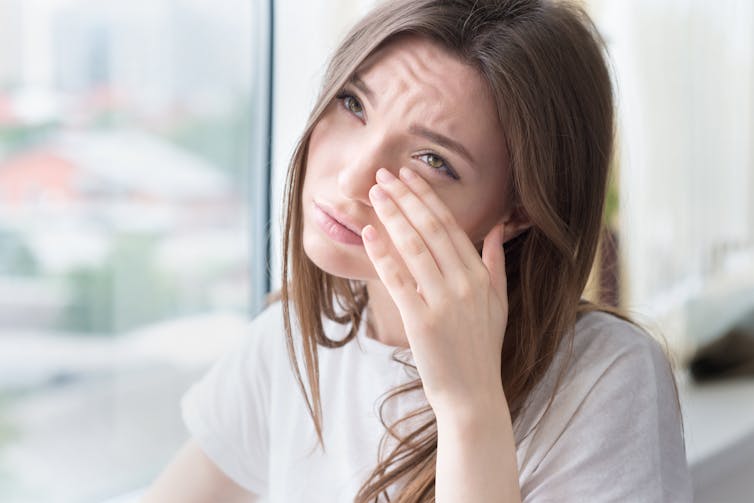Bushfire smoke is bad for your eyes, too. Here's how you can protect them
- Written by Katrina Schmid, Associate Professor, Queensland University of Technology
As we continue to contend with smoke haze in various parts of the country, many Australians may find themselves with watery, burning, irritated or red eyes.
Data from countries with consistently poor air quality suggest there could also be a risk of longer term effects to our eyes, particularly with prolonged exposure to bushfire smoke.
Although P2/N95 masks can protect us from inhaling harmful particles, unfortunately they can’t protect our eyes.
But there are certain things you can do to minimise irritation and the risk of any longer term effects.
Read more: We know bushfire smoke affects our health, but the long-term consequences are hazy
Irritation in the short term
The eye’s surface is continuously exposed to the environment, except when our eyes are shut when we sleep.
Bushfire smoke contains dust, fumes (such as carbon monoxide and nitrogen oxides), and tiny particles called PM10 and PM2.5.
When the smoke comes into contact with our eyes, the fumes and small particles dissolve into our tears and coat the eye’s surface. In some people, this can trigger inflammation, and therefore irritation.
Read more: Bushfire smoke is everywhere in our cities. Here's exactly what you are inhaling
The presence of a marker called matrix metalloproteinase-9, or MMP-9, indicates the eye is inflamed.
During periods of poor air quality from bushfires in the United States, MMP-9 was present in the eyes of more people than it ordinarily would be.
Longer term risks
We know very little about how pollution from bushfire smoke might affect our eyes over the longer term, or what damage repeated or chronic exposure might do.
But we do know people who live in areas with high levels of air pollution, such as China, are three to four times more likely to develop dry eye.
Dry eye is a condition where a person doesn’t have enough tears or they are of such poor quality they don’t lubricate and nourish the eye. We need high quality tears to maintain the health of the front surface of the eye and provide clear vision.
For people who already have dry eyes – often older people – poor air quality may increase the damage. The smoke and pollution may cause intense stinging and a feeling of grittiness to the point they can barely open their eyes.
 Avoid rubbing your eyes, as this could make the irritation worse.
From shutterstock.com
Avoid rubbing your eyes, as this could make the irritation worse.
From shutterstock.com
While dry eye is a result of damage to the surface of the eyes, it’s also possible pollutants entering the blood stream after we breathe them in could affect the blood supply to the eye. This in turn could damage the fine vessels within the eye itself.
Research has suggested high levels of air pollution in Taiwan may increase the risk of age-related macular degeneration, which could be an example of this.
We need more research into the long-term effects on our eyes of prolonged poor air quality, particularly from bushfire smoke. But what we do know suggests it’s possible bushfire smoke could be causing subtle damage to the eyes, even in people without any symptoms.
Read more: Even for an air pollution historian like me, these past weeks have been a shock
What can you do to protect your eyes from the smoke?
- the best option is to avoid going outside when air quality is at is worst, where possible
- wearing sunglasses or glasses when outside if you need them might stop some of the dust carried in the wind from contacting the eye’s surface (but it won’t stop the tiny particles getting in)
- avoid wearing contact lenses if possible.
Some tips if your eyes are irritated
- flush your eyes as often as you can, with over-the-counter lubricant eye drops if you have some on hand. If not, use sterile saline solution or clean bottled water
- if your eyes are itchy, flush them and then place a cool face washer over your closed lids
- don’t rub your eyes, as this could make the irritation worse.
If your eyes are red and sore and these steps don’t help, it’s best to see an eye care professional.
Read more: From face masks to air purifiers: what actually works to protect us from bushfire smoke?
Authors: Katrina Schmid, Associate Professor, Queensland University of Technology





